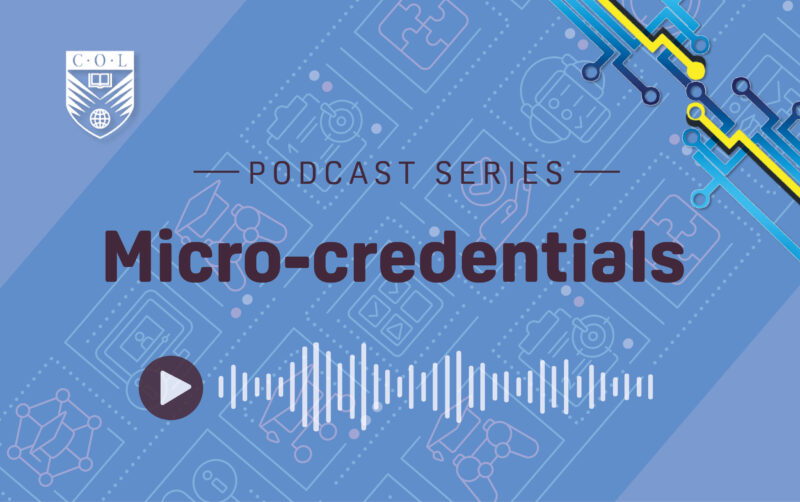
By Dr Jako Olivier
COL Adviser: Higher Education
Micro-credentials refer to a form of certification that is evidence of achievement of specific knowledge, skills or competencies after someone has gone through a structured learning experience. In a rapidly evolving job market, traditional degrees may not always meet the demand for upskilling and reskilling. Micro-credentials offer a solution by recognising short-term learning experiences. Furthermore, micro-credentials have the potential to support the mobility of qualifications across countries and allow for the stacking of many short-term training opportunities to acquire qualifications that are recognised for employment. This is especially relevant in an increasingly competitive, globalised, and technology-oriented work environment that requires employees to be lifelong learners.
In the Commonwealth, using micro-credentials is at a nascent stage. Hence, the Commonwealth of Learning (COL) recently initiated a new project: Developing a Commonwealth Credit Transfer Framework: Micro-credentials in a Digital Age. A consultative process that will inform the framework has already started, involving research and several regional consultation meetings.
The need for a Commonwealth-wide framework builds on the success of a number of frameworks for micro-credentials internationally. In this regard, the National Microcredentials Framework of Australia is an example. This framework not only defines micro-credentials for this context but also provides some unifying principles, information requirements and minimum standards for micro-credentials. While in Malaysia, the Malaysian Qualifications Agency produced the Guidelines to Good Practices: Quality Verification of Stand-Alone Micro-Credentials in 2023. This document provides a guide for the systematic development of stand-alone micro-credentials and supports the unbundling of higher education institution programs for non-traditional learners while ensuring quality. Furthermore, there have been good practices in Canada and New Zealand using micro-credentials, with some emerging regional initiatives also already ongoing in the Caribbean and Southern Africa.
In this context, Dr Jako Olivier, Adviser: Higher Education COL, recently interviewed Professor Rebecca Ferguson, an expert on micro-credentials, to discuss a recent publication written by her and co-author Professor Denise Whitelock from The Open University, UK and COL Chair, entitled Microcredentials for Excellence: A Practical Guide.
The interview provides an overview of the concept of micro-credentials and the nature and relevance of a pedagogy of micro-credentials. Furthermore, the ways in which learning opportunities could be expanded and employment-related training could be strengthened using micro-credentials were also covered. COL’s project around the Commonwealth Credit Transfer Framework for Micro-credentials was also discussed.
From this interview, the following key takeaways emerged. Micro-credentials represent a means of certifying short learning experiences, often recognised through badges, certificates, or credits. They offer a formal mechanism to acknowledge skills acquired through open and distance learning, providing a pathway for learners to demonstrate competencies in a structured and credible manner.
For governments, adopting micro-credentials requires the establishment of clear objectives, such as enhancing technical and vocational education, aligning academic programmes with industry needs, and improving workplace skills. As the demand for lifelong learning grows, the future of micro-credentials lies in their potential to expand access to diverse learning opportunities, validate non-traditional learning pathways, and reinforce employment-related competencies.
To maximise their impact, credit transfer frameworks for micro-credentials must address critical aspects such as mobility between institutions, cross-sector applicability, and international recognition. Ensuring the success of such frameworks further depends on achieving broad stakeholder support, implementing rigorous quality assurance mechanisms and maintaining financial sustainability.
Watch the full interview here: https://youtu.be/IclAjrVyuBQ


